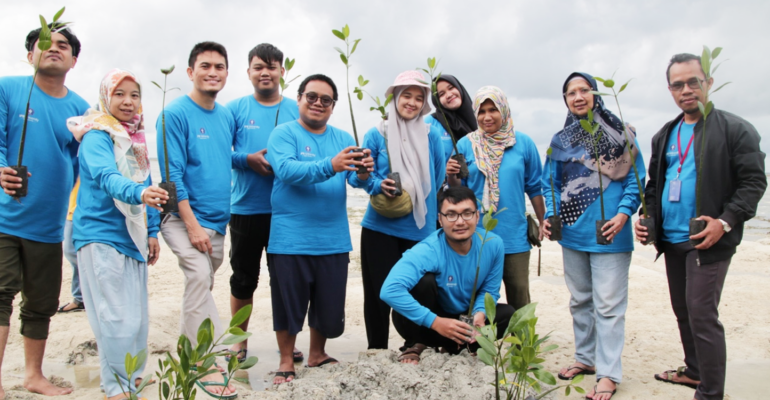IPB University Graduate School Students Plant Mangroves for Small Island Coastal Sustainability

Students of Tropical Ocean Economics of the Graduate School of IPB University held a Field Trip to Tidung Island, Kepulauan Seribu Regency, DKI Jakarta province on Friday 19/1. The activity focused on mangrove planting in order to maintain coastal resilience and welfare in the Tidung Island area, precisely on Small Tidung Island.
Dr Kastana Sapanli, Chairman of the Tropical Ocean Economics Study Program, stated that the mangrove ecosystem is one of the most important ecosystems for small islands, and its existence must continue to be maintained and preserved.
“The Tropical Ocean Economics Study Program, in collaboration with Kamar Ijo Community and the Jakarta Provincial Food Security, Marine, and Agriculture Agency (DKPKP), participated in maintaining the sustainability of mangrove ecosystem resources through planting 500 Rhizophora mangrove seedlings,” said Dr Kastana.
The mangrove planting was also accompanied by Fajrur, the Jakarta Provincial Food Security, Marine, and Agriculture Agency (DKPKP) staff member, as well as the administrator in charge of mangrove conservation. He explained the different types of mangroves to be planted and the planting techniques.
“The coastal substrate on Tidung Island is more sand than mud, so the planting technique is done in groups and directly planted with polybags. This technique is used because the currents are quite strong and the substrate is sandy, and the mangrove seedlings will protect each other, increasing the chances of mangrove survival,” he explained.
He continued that the participants were very enthusiastic about the mangrove planting activity and hoped that the mangroves would grow perfectly in the future, benefiting the residents of Tidung Island. The planting process was also assisted by internship students from Riau University.
“It is hoped that this mangrove planting can grow well in the next four to five years so that it can become an abrasion barrier in the Thousand Islands, especially on Tidung Island,” he said.
Bayi, a Jakarta Provincial Food Security, Marine, and Agriculture Agency (DKPKP) representative, thanked the students and lecturers of IPB University’s Tropical Ocean Economics Study Program for taking real action as a form of environmental concern through mangrove planting. “It is hoped that the mangroves planted can grow well and that concern for the environment can continue,” said Bayi. (*/Lp) (IAAS/FAE)



